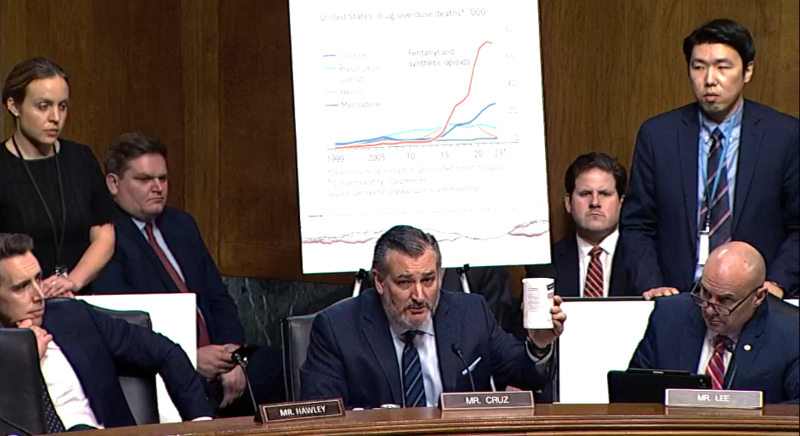The U.S. Senate Judiciary Committee considered whether to permanently classify fentanyl and its related substances as Schedule I drugs, a move that could have significant impacts on law enforcement, public health and the deadly ongoing opioid crisis.
The proposal seeks to extend the temporary Schedule I classification that is about to expire. Schedule I drugs, such as heroin and LSD, are each classified as having no accepted medical use and a high potential for abuse. Fentanyl is currently a Schedule II drug, meaning it is highly addictive but has legitimate medical uses, such as pain management for cancer patients or surgical procedures.
Senate Judiciary Committee Chairman Chuck Grassley, R-Iowa, and Sens. Bill Cassidy, R-La. and Martin Heinrich, D-N.M. introduced the Halt Lethal Trafficking (HALT) Fentanyl Act, which would permanently classify fentanyl-related substances as Schedule I under the Controlled Substances Act.
Fentanyl is at the center of the opioid overdose crisis in the United States and is illegal nationwide. However, traffickers get around the law by making slightly altered versions of the drug, which are still highly potent but chemically modified just enough to avoid being classified as fentanyl.
To combat the crisis, the Drug Enforcement Administration temporarily banned fentanyl-related substances in 2018 under President Donald Trump. Congress renewed the temporary ban several times, but it is set to expire on March 31 unless new legislation makes it permanent.
According to the Centers for Disease Control and Prevention, synthetic opioids like fentanyl were involved in more than 75% of all opioid-related deaths in 2021.
The rise in deaths that are caused by fentanyl is primarily linked to illicit fentanyl, which is manufactured illegally and often mixed with other drugs, such as heroin or counterfeit pills, often without the user’s knowledge.
While Dr. Cecilia Farfán, an affiliated researcher with the Institute on Global Conflict and Cooperation, cited the U.S. Sentencing Commission showing that 86.4% sentenced for trafficking fentanyl in 2023 were United States citizens, Sen. John Cornyn, D-Texas, questioned whether the estimated 1.7 million getaways at the border played a role smuggling.
Data from DHS and the DEA reports suggest that while cartels primarily rely on U.S. citizens for trafficking, much of the fentanyl itself is produced in Mexico with chemicals from China.
Even just a small amount of fentanyl can be deadly. Supporters of the classification, including some lawmakers and law enforcement officials, suggest that permanently making the drug a Schedule 1 drug would help strengthen the government’s ability to combat trafficking and the ability to prosecute dealers.
More than 150 organizations came together to urge Congress to vote against the Act in 2023, expressing concerns that it would perpetuate ineffective and discriminatory drug policies.
Sheriff Donald Barnes noted that addressing the issue is more than addressing just one part of the crisis; it is addressing several different moving parts. He reiterated that the only way to end the crisis is starting before it comes into the U.S.
“China is the first domino that tips in contributing the fentanyl crisis,” said the Sheriff.
“The best place to hit a disease is the beginning,” said Dr. Timothy W. Westlake, a long-time advocate. He stated the goal of the class scheduling is laser-focused on removing the incentive for the creation and, therefore, could potentially halt the development of deadly fentanyl poisons at their origin.
Sen. Katie Britt, R-Al, noted that border security is important to halt the flow of fentanyl. She stated that data shows that under the Biden administration’s open border policy, prosecution statistics only account for those who were caught, prosecuted, and sentenced but do not include those who got away. Britt continued that the U.S. missed around 90% to 95% of fentanyl coming from the southern border.
Trump and Mexico’s President Claudia Sheinbaum agreed to postpone a 25% tariff on Mexican imports for one month; in return, Mexico will deploy 10,000 troops to enhance border security, stop illegal immigration, and stop fentanyl trafficking.
Survivor Parent and Founder of the Devin J. Norring Foundation Bridgette Norring noted the lack of responsibility for social platforms, which are often used for the pass and flow of buying drugs. President and Co-Founder of Victims of Illicit Drugs Jaime Puerta agreed, saying what is happening isn’t free speech but criminal behavior, saying, “If it’s a criminal act in the real world … it should be in the social media world.”
Sen. Ted Cruz, R-Tx, supported the HALT Fentanyl Act, highlighting the huge amount of fentanyl coming across the border. To put it in perspective, he explained that a sugar packet filled with fentanyl could kill 500 people, while a small container could kill 368,500. Cruz used a bag of sugar as a visual aid, stating that a single bad could contain enough fentanyl to kill nearly one million people.
Sen. John Kennedy, R-La., used ziplock bags to show the difference in the amount of time served for the amount in the bags, saying, “It’s like cell deep stupid, isn’t it? ” Kennedy reintroduced his bill, the Fairness in Fentanyl Act, which lowers the drug quantity thresholds that trigger mandatory minimum sentences for fentanyl trafficking, reflecting its potency.
The Act would reduce the threshold from 400 grams to 20 grams for high-level offenders and 40 grams to 2 grams for low-level offenders. It would also enhance postal inspections to stop illegal fentanyl shipments.
U.S. Customs and Border Patrol’s fentanyl seizures increased 31% nationwide from August to September, according to reports, and had a total of nearly 22,000 pounds of fentanyl seized in fiscal year 2024.
After the hearing, the committee is expected to vote on whether to advance the HALT Fentanyl Act for a full Senate vote.







